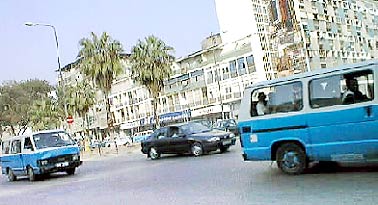The lowdown on Luandan cuisine, make-believe
Monopoly, and a landscape of ramshackle
shelters and high-rises
There were twice as many empty seats as passengers on flight
#077 from London to Luanda. Those who sat in business class
wore conservatively tailored suits or polo shirts with khakis,
while we in the coach cabin were divided among those who wore
jeans and t-shirts emblazoned with the name of our nongovernment
organizations and those who wore starched white linen suits
and dark sunglasses.
The man next to me seemed to be none of
the
above.
His face
was well-tanned and by the look of his attire, I thought he
might have been off for safari or a mercenary expedition. The
smell of his cognac kept me nauseated and decidedly awake,
so I spent most of the flight sorting through catalogs and
counsel collected from the British Angola Forum during my brief
stopover in London.
| |

The apartment came with a sliding
lock on the door ... and a roommate |
The flight touched down at 3:50 a.m. GMT – 40
minutes ahead of schedule. I sleepily negotiated the rounds
from the yellow fever vaccination certificate inspection, through
immigration, and, stammering in broken Portuguese, past the
customs official. Finally, I stepped out into the humid night
air and looked about for my gracious Angolan hosts. We missed
each other at the airport, but found one another at the stoop
of her apartment building in Combatentes – a
neighborhood just outside of the Luanda downtown. She showed
me to my room, a cheerful
space just then illuminated with the early glow of dawn.
Waking around noon, I found we
were off to a friend's house for lunch. It is Angolan
tradition to reserve Saturdays for lunching with friends and
family – and what a meal: grilled fish with sweet potatoes,
sweet bananas, cassava and white beans in a palm oil sauce … and
a generous glass of Portuguese wine.
After lunch, we played a fierce game of Monopoly. The irony
of the game was almost surreal. The object is, of course, to
consolidate all of the assets on the board – the ultimate
end being the enrichment of one versus an increasingly destitute
remainder. Eventually, the impoverished are pushed out of competition
and surrender. I, knocked out of competition early on,
viewed the rest of the game thinking about the incredible disparity
in
wealth among Angolans. How many get knocked out
of the game? What becomes of them?
We drove back to Luanda in the thick darkness of night. The
ramshackle shacks we had seen on the drive out were invisible
in the shadows and the lights of downtown Luanda glittered
like diamonds in the moonless night. As we climbed the stairs
to the apartment, a strong wind swept a fine ochre dust through
the streets, gliding between the high-rises and the makeshift
shelters scattered about their bases.
— Kristin

